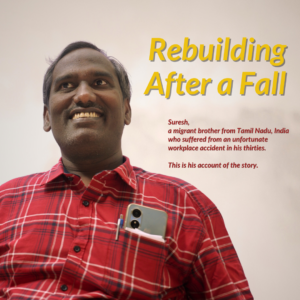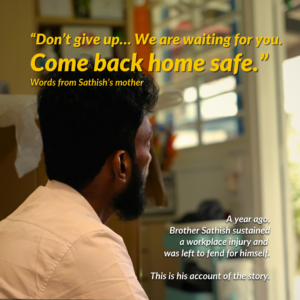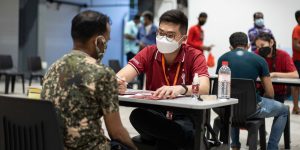Our longest staying Chinese migrant worker, T, has finally gone home after staying in Singapore for the past 5 years. I was privileged to be part of his last few days in Singapore as he shared his story with me.
T came to Singapore to work back in 2013. However, due to a workplace injury which caused him to be blind in one eye, he was unable to work since October 2014. Because T was not insured, his employer was unable to pay up when the Ministry of Manpower issued a labour court order of $93,000 in September 2015, and the amount subsequently accumulated to $122,836.48. Although his employer could be fined up to $10,000 or jailed up to a year, or both, the consequence that T’s employer could face will hardly improve T’s situation as he still would not be paid for the amount owed to him. Outside of his workplace injury, he has also met with two car accidents, which caused him to be crippled for the rest of his life. Because of his injuries, he had not been working and was unable to bear the medical expenses for future treatments.
While conversing with T, I understood the distress that he was in because he was unable to share the financial burden with his son due to his injury. His son not only has to provide for T, T’s mother and wife, but also provide for his family of three as well. As I listened to him, I felt indignant that he has to go through such a difficult phase in life, because it never occurred to me that such a situation could happen to someone, and the emotional distress that he experienced was something that I would probably be unable to comprehend. His family was also facing a crisis from 2015 as he recounted that his house was destroyed during a flash flood in his hometown. He told us that his family has since then been staying with his sister, and I could sense that he would not want to rely on his sister if not for his injury and his inability to earn money. While staying in Singapore for the past 5 years, T has not met his granddaughter, who is now 5 years old. And what made me more emotional is that he has kept his situation a secret from his aged mother because he did not want her to worry about him. At that point, I could feel his love for his mother and that he was a really filial son despite the difficult situation he was in. Things took a turn for the worse when his mother became critically ill and T not only has to worry about his mother’s health, but also the procedures he has to go through in the event of her possible death.
From what T has explained, the funerals for both parents are done very differently; a father’s funeral would only require the presence of his immediate family and relatives, but a mother’s funeral has to go through a whole new different procedure where all her family members, be it immediate or distant, as well as her friends and acquittances have to be invited to her funeral. As funerals will take place in the course of 4 days, his expenses not only have to include food and beverages that are to be prepared for the visitors, but also their accommodations as they will be coming from different parts of China to see his mother for one last time. All these pose as huge problems to T as he not only has to find a venue to hold the funeral, but also to spend a lump sum of money for the visitors. It hit me how this would not be something Singaporeans have to worry about and I could feel the weight on his shoulders as he spoke with much distress as these problems would hit him when he returns back to China. I sincerely hope that things will eventually work out for him.
Throughout the conversations with T, I saw how resilient he is as a person because despite the numerous setbacks that he faced, he did not complain about life nor did he give up on life, which I think I would have if I were in his shoes. His situation made me realise how lucky we are to be living in Singapore, an island almost free from such natural catastrophes which spares us the possibility of such hurt. Unlike him, I also never really worried about not being paid by my employer for a workplace injury or being unable to afford the medical treatment. His situation made me understand the value of the things that I have as the things I take for granted are much harder to come by for them.
By: Tan Jia Qi, HealthServe Volunteer Development Intern





